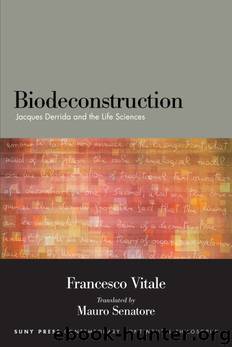Biodeconstruction by Vitale Francesco

Author:Vitale, Francesco
Language: eng
Format: epub
Publisher: State University of New York Press
Published: 2018-04-14T16:00:00+00:00
Beyond the Pleasure Principle: Différance
Freud begins with summarizing the assumptions of psychoanalysis with regard to the hegemony of the pleasure principle in psychic life. He introduces an economic point of view that allows him to account for the energetic and not merely the structural dimension of the pleasure principle:
In the Theory of psycho-analysis we have no hesitation in assuming that the course taken by mental events is automatically regulated by the pleasure principle. We believe, that is to say, that the course of those events is invariably set in motion by an unpleasurable tension, and that it takes a direction such that its final outcome coincides with a lowering of that tension, that is, with an avoidance of unpleasure or a production of pleasure. In taking that course into account in our consideration of the mental processes which are the subject of our study, we are introducing an “economic” point of view into our work; and if, in describing those processes, we try to estimate this “economic” factor in addition to the “topographical” and “dynamic” ones, we shall, I think, be giving the most complete description of them of which we can at present conceive, and one which deserves to be distinguished by the term “metapsychological.”5
Given the insufficiency of the definitions of pleasure inherited from the philosophical and psychological traditions, Freud proposes a definition that essentially takes up the economic terms and the neuro-physiological arguments he had elaborated at the time of the Project: “We have decided to relate pleasure and unpleasure to the quantity of excitation that is present in the mind but is not in any way ‘bound’; and to relate them in such a manner that unpleasure corresponds to an increase in the quantity of excitation and pleasure to a diminution.”6 At this point, we encounter a preliminary, obvious objection: the affirmation of the hegemony of the pleasure principle clashes with incontrovertible evidence: the displeasure that characterizes several phenomena of psychical life. However, psychoanalysis had already dealt with this objection and had responded by introducing the reality principle:
The most that can be said, therefore, is that there exists in the mind a strong tendency towards the pleasure principle, but that that tendency is opposed by certain other forces or circumstances, so that the final outcome cannot always be in harmony with the tendency towards pleasure. … We know that the pleasure principle is proper to a primary method of working on the part of the mental apparatus, but that, from the point of view of the self-preservation of the organism among the difficulties of the external world, it is from the very outset inefficient and even highly dangerous. Under the influence of the ego’s instincts of self-preservation [Selbstheraltungstriebe], the pleasure principle is replaced by the reality principle.7
The search for a direct and immediate satisfaction of the pleasure principle, which the primary drive processes express, may expose the individual to threats coming from the external environment and thus put life in danger. The “reality principle,” the expression of
Download
This site does not store any files on its server. We only index and link to content provided by other sites. Please contact the content providers to delete copyright contents if any and email us, we'll remove relevant links or contents immediately.
The remains of the day by Kazuo Ishiguro(8998)
Tools of Titans by Timothy Ferriss(8393)
Giovanni's Room by James Baldwin(7346)
The Black Swan by Nassim Nicholas Taleb(7129)
Inner Engineering: A Yogi's Guide to Joy by Sadhguru(6793)
The Way of Zen by Alan W. Watts(6614)
The Power of Now: A Guide to Spiritual Enlightenment by Eckhart Tolle(5781)
Asking the Right Questions: A Guide to Critical Thinking by M. Neil Browne & Stuart M. Keeley(5775)
The Six Wives Of Henry VIII (WOMEN IN HISTORY) by Fraser Antonia(5515)
Astrophysics for People in a Hurry by Neil DeGrasse Tyson(5189)
Housekeeping by Marilynne Robinson(4446)
12 Rules for Life by Jordan B. Peterson(4304)
Ikigai by Héctor García & Francesc Miralles(4274)
Double Down (Diary of a Wimpy Kid Book 11) by Jeff Kinney(4268)
The Ethical Slut by Janet W. Hardy(4251)
Skin in the Game by Nassim Nicholas Taleb(4248)
The Art of Happiness by The Dalai Lama(4130)
Skin in the Game: Hidden Asymmetries in Daily Life by Nassim Nicholas Taleb(4006)
Walking by Henry David Thoreau(3962)
